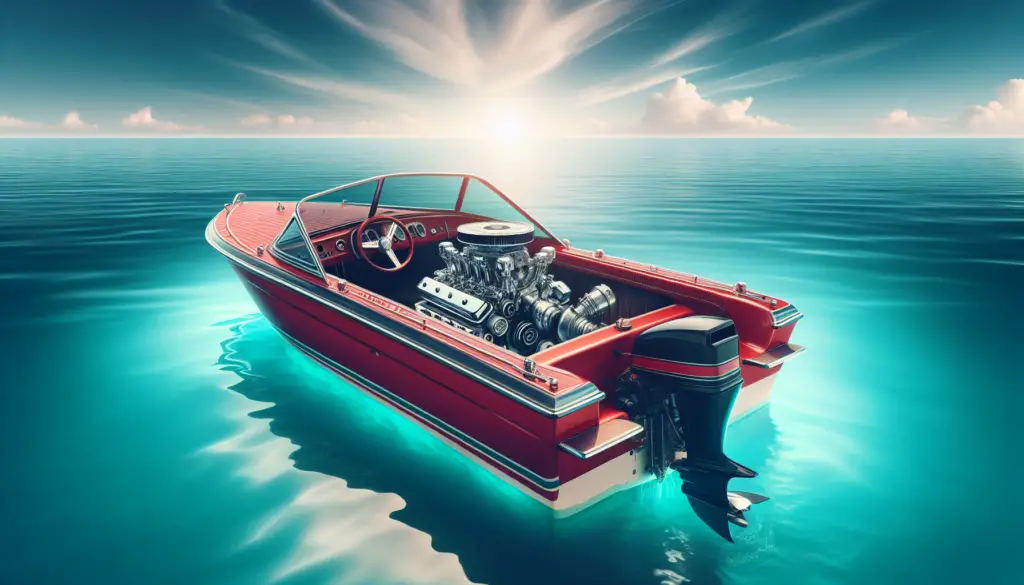In “Knowing When To Call A Professional For Boat Engine Maintenance,” the focus revolves around the often-daunting decisions and discernments that come with boat ownership. It particularly endeavors to enlighten you on the signs to look out for – potential problem indicators – that hint at the need for a professional hand in your boat engine’s care. It emphasizes on when your knack for DIY should take a back seat for expert intervention, offering guidance on the crucial juncture between regular boat maintenance you can handle and intricate issues that call for seasoned expertise.

Understanding Your Boat’s Engine
Knowing your boat’s engine can save you a lot of hassle, time, and money. This is why you’ll often hear experienced sailors say, “knowledge is power.”
Basics of boat engine operations
Boat engines have three essential functions: getting energy from fuel, using that energy to create motion, and dispensing the waste products created in the process. To get familiar with its functions, it’s best to read the manual that comes with your boat. If you do not have one, try finding it online. Understanding the principles of how your boat engine operates will give you insight into what could be going wrong when it isn’t working properly.
Differences between various engine types
Engines of boats are also different in many ways, but mainly in two categories: inboard and outboard motors. The outboard motor is a self-contained unit that includes an engine, gearbox, and propeller or jet drive, and it’s designed to be mounted at the stern of the boat. On the other hand, an inboard motor is an engine enclosed within the hull of the boat, usually connected to a propulsion screw by a driveshaft.
Regular maintenance tasks you can do
Regular maintenance tasks include changing out the engine oil, inspecting and replacing spark plugs and filters, checking the belts, and cleaning and replacing the propellers. A well-kept boat engine operates efficiently and prolongs the life of your vessel. Regularly check your engine for any abnormalities or any signs of wear and tear.
Recognizing the Signs of Engine Trouble
One of the first steps towards becoming a competent boat owner is recognizing the signs of engine trouble early.
Unusual noises from the engine
Boat engines are not silent, but if you start hearing unusual sounds like rumbling, knocking, or hissing, that could be a sign of trouble. These noises might suggest problems ranging from loose parts or dying batteries to issues with the exhaust system.
Decreased performance or fuel efficiency
If your boat seems to be working harder and consuming more fuel to achieve the same speed or if it struggles to reach the speed it once did, it’s time to look at the engine. This could be an indication of a worn-out propellant or a clogged fuel line.
Excess smoke or unusual exhaust
Your boat’s exhaust should be clear. If you notice black, white, or blue smoke, there might be an issue. Black smoke indicates incomplete combustion of fuel, white smoke might mean water in the fuel or a cooling issue, and blue smoke could mean you’re burning oil.
Regular Maintenance and Its Importance
Like any vehicle, boats need regular maintenance to function at their best and last longer.
Benefits of regular engine check-up
Regular engine check-ups can prevent minor issues from ballooping into major problems that could potentially lead to substantial repair costs. It ensures optimal performance, prolongs the life of your boat, and protects your investment.
Items commonly included in a maintenance routine
A routine check-up generally includes changing the engine oil, replacing the spark plugs, checking the belts, filters, and propellers, and maintaining the right fuel quality. It can also include checking for leaks, inspecting the hull for damage, and testing the electrical systems.
Duration between each maintenance check
The exact time between each maintenance check can vary depending on the type and age of your boat, the type of engine, and how often you use your boat. However, a general guideline is to conduct a minor check-up every 50-100 hours of operation, or at least once a season.
DIY Maintenance vs. Professional Maintenance
Tasks related to the maintenance of boat engines can be divided into DIY tasks and tasks for professionals.
Tasks that can be done on your own
Some tasks are pretty simple and can be done without professional help. These tasks might include changing the oil, cleaning or changing the filters and spark plugs, checking the belts, and cleaning the exterior of the engine.
When to consider professional help
There are times when it’s better to call in a professional. This includes instances when you notice extreme changes like overheating, not starting right away, or when there’s too much smoke from the exhaust. You might also need a professional to conduct a thorough engine tune-up or handle complex repairs and replacements.
The risks of DIY when not done properly
While DIY maintenance can save you money, if done incorrectly, it can lead to more damage and costlier repairs. Always make sure you know what you’re doing, have the right tools and parts, and understand the risks before you begin.

Common Engine Problems That Require a Professional
There are some problems with your boat’s engine that will require the help of a professional to fix.
Persistent overheating issues
If your engine continues to overheat despite your efforts to fix it, you probably need a professional. Overheating could be due to a problem with the cooling system, and if not properly addressed, it can lead to major engine damages.
Difficulties in starting the engine
If your boat has trouble starting or doesn’t start at all, this could be a symptom of several issues—like electrical problems, battery issues, or starter motor failures. Professionals can pinpoint the exact issue and ensure a proper repair.
Problems with the propeller
Propeller problems can reduce the performance of your boat and cause undue stress to the engine. If your propeller is damaged, it usually needs the skills and the tools of a professional to fix or replace.
Choosing a Boat Engine Maintenance Professional
Don’t settle when it comes to maintaining the heart of your boat. Choose the best professional you can afford.
Qualities to look for in a professional
Look for a professional with a solid reputation, certified credentials, good customer reviews, and someone who has experience working with the specific make and model of your boat’s engine. The way they communicate and respond to your queries can also say a lot about their competence and professionalism.
Questions to ask when assessing competence
Ask about their experience, certification, warranty on work done, and if they can provide customer referrals. Ensure they can do both preventative and corrective maintenance tasks, and ask them to explain complex procedures to measure their knowledge.
Where to find certified professionals
You can use online directories, ask for recommendations from your local marina, or directly contact your boat’s manufacturer for a list of their service providers.
The Process of Professional Boat Maintenance
An understanding of what’s entailed during a professional boat maintenance visit can give you peace of mind.
What to expect during a maintenance visit
After dropping off your boat, the professional will usually do a thorough inspection of the engine, diagnose any issues, and report back to you with a breakdown of what needs to be done along with a cost estimate. Once you’ve given the go-ahead, they’ll perform the necessary tasks and then test your boat to make sure everything’s working properly.
Understanding the maintenance report
It’s essentially a diagnostic report of your boat’s engine health. It includes details on what was checked, any issues found, what repairs were done, parts replaced, and any recommendations for future service. Understand everything on this report and ask questions if something isn’t clear.
Post-maintenance care tips
The professional will likely give you some maintenance tips specific to your boat. These may include advice on best practices for operating and storing your boat, as well as intervals for future check-ups or maintenance.
The Long-Term Costs of Neglecting Maintenance
Neglecting regular maintenance can lead to drastic consequences.
How engine problems can escalate over time
Small issues that could have been fixed easily and cost-effectively can escalate into much larger problems that may eventually require significant repair or even replacement of parts, leading to substantial costs.
Financial implications of delayed maintenance
Delayed maintenance is always more expensive in the long run. It can result in the need for extensive repair work, more expensive parts, increased operational costs due to lowered fuel efficiency, and sometimes even the need for a complete engine replacement.
Impact on the boat’s overall lifespan and value
Regular maintenance is an investment in the longevity and value of your boat. Neglecting it can decrease your boat’s lifespan and depreciate its value rapidly.
Making Maintenance Easier: Boat Engine Care Tips
Armed with knowledge and a few simple tips, you can make boat engine care easier and more effective.
Routine cleaning and check-up practices
Regular cleaning of your boat’s engine is crucial. Check-ups of the oil, filters, and belts can detect early signs of potential issues before they become more serious. Always take the time to do a quick check of your engine before each boat trip, too.
Proper engine usage for longer lifespan
Avoid pushing your boat’s engine too hard. Allow it to warm up before pushing the throttle, and give it a moment to cool down before turning off the engine. This gives all the components time to reach their operating temperatures and can prolong the engine’s lifespan.
Choosing the right fuel and oil
Using the right type of fuel and oil for your boat’s engine can make a crucial difference. Always use high-quality fuel and oil and follow the manufacturer’s recommendations.
Space Consideration: In Water Versus Out of Water Maintenance
Understanding the differences between in water and out of water maintenance can help you decide the best approach for your boat.
Benefits and drawbacks of in water maintenance
In water maintenance allows you to perform necessary tasks without having to haul your boat out of the water. This can save you time and marina fees. However, it can also limit the areas of the boat you can access and the types of maintenance you can perform.
Benefits and drawbacks of out of water maintenance
Out of water maintenance involves hauling your boat out of the water. While it may be more expensive and time-consuming, it allows for a more thorough inspection and more extensive maintenance tasks. It’s also the best time to check for hull damage and perform any necessary repairs or antifouling.
Choosing the option best suited for your boat and situation
The best option will depend on your boat’s maintenance needs, budget, and access to facilities. Follow the maintenance schedule suggested in the boat’s manual and take into consideration the recommendations of the maintenance professional, factors like age and make of the boat, and how often and in what environments the boat is used.
In conclusion, regular boat maintenance is the key to protecting your investment and ensuring countless days of safe and fun-filled boating. Whether you choose to DIY some tasks, hire a professional, or do a mix of both, remember that proactive care beats reactive repair.

